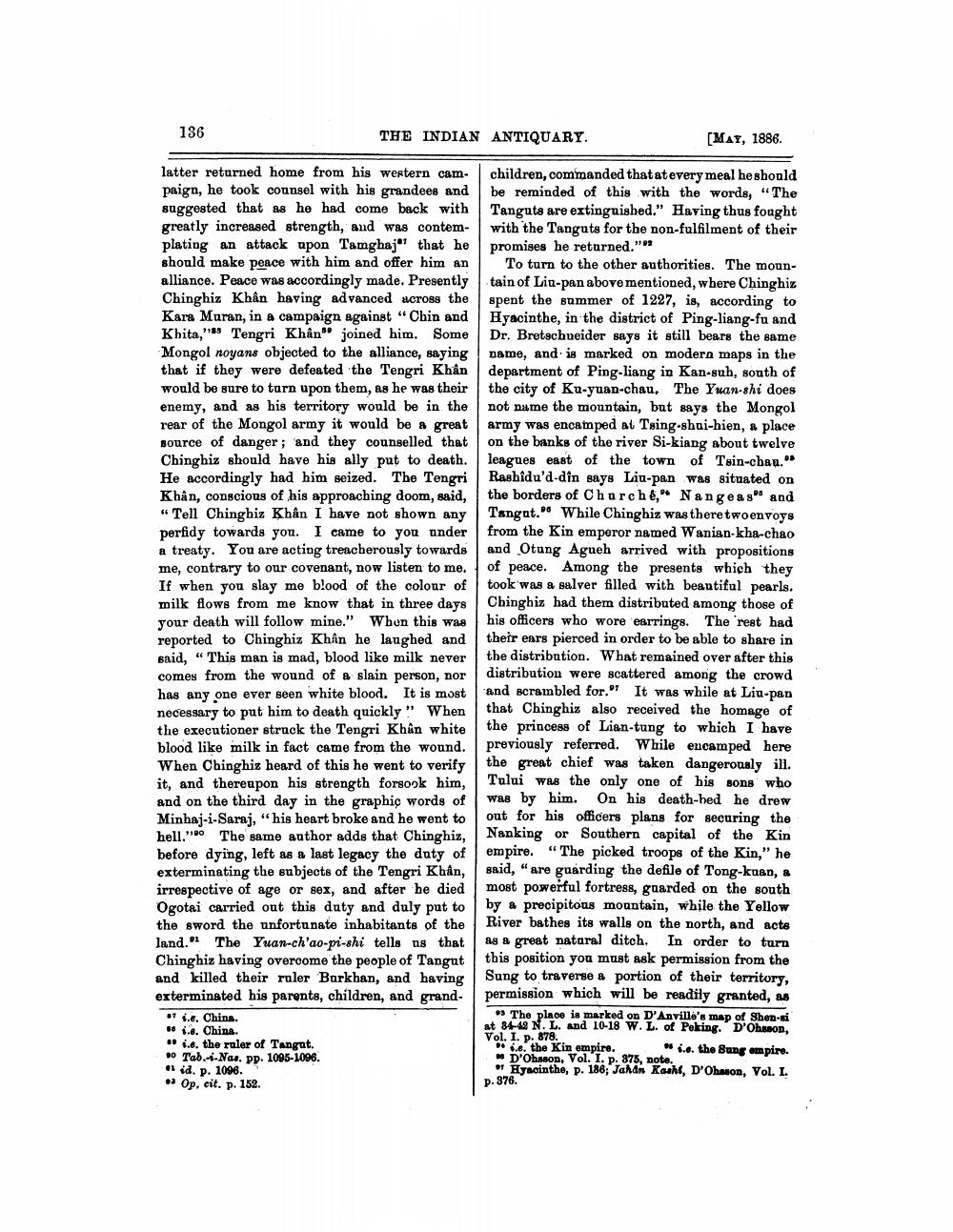________________
136
latter returned home from his western campaign, he took counsel with his grandees and suggested that as he had come back with greatly increased strength, and was contemplating an attack upon Tamghaj" that he should make peace with him and offer him an alliance. Peace was accordingly made. Presently Chinghiz Khân having advanced across the Kara Muran, in a campaign against "Chin and Khita," Tengri Khân" joined him. Some Mongol noyans objected to the alliance, saying that if they were defeated the Tengri Khân would be sure to turn upon them, as he was their enemy, and as his territory would be in the rear of the Mongol army it would be a great source of danger; and they counselled that Chinghiz should have his ally put to death. He accordingly had him seized. The Tengri Khân, conscious of his approaching doom, said, "Tell Chinghiz Khân I have not shown any perfidy towards you. I came to you under a treaty. You are acting treacherously towards me, contrary to our covenant, now listen to me. If when you slay me blood of the colour of milk flows from me know that in three days your death will follow mine." When this was reported to Chinghiz Khân he laughed and said, "This man is mad, blood like milk never comes from the wound of a slain person, nor has any one ever seen white blood. It is most necessary to put him to death quickly" When the executioner struck the Tengri Khân white blood like milk in fact came from the wound. When Chinghiz heard of this he went to verify it, and thereupon his strength forsook him, and on the third day in the graphic words of Minhaj-i-Saraj, "his heart broke and he went to hell." The same author adds that Chinghiz, before dying, left as a last legacy the duty of exterminating the subjects of the Tengri Khân, irrespective of age or sex, and after he died Ogotai carried out this duty and duly put to the sword the unfortunate inhabitants of the land. The Yuan-ch'ao-pi-shi tells us that Chinghiz having overcome the people of Tangut and killed their ruler Burkhan, and having exterminated his parents, children, and grand
i.e. China.
sei.e. China.
i.e. the ruler of Tangat.
so Tab.-i-Nas. pp. 1095-1096.
THE INDIAN ANTIQUARY.
id. p. 1096.
Op, cit. p. 152.
[MAY, 1886.
children, commanded that at every meal he should be reminded of this with the words, "The Tanguts are extinguished." Having thus fought with the Tanguts for the non-fulfilment of their promises he returned.""*
To turn to the other authorities. The mountain of Liu-pan above mentioned, where Chinghiz spent the summer of 1227, is, according to Hyacinthe, in the district of Ping-liang-fu and Dr. Bretschneider says it still bears the same name, and is marked on modern maps in the department of Ping-liang in Kan-suh, south of the city of Ku-yuan-chau, The Yuan-shi does not name the mountain, but says the Mongol army was encamped at Tsing-shui-hien, a place on the banks of the river Si-kiang about twelve leagues east of the town of Tsin-chau." Rashidu'd-din says Liu-pan was situated on the borders of Churchê," Nangeas and Tangut." While Chinghiz was there two envoys from the Kin emperor named Wanian-kha-chao and Otung Agueh arrived with propositions of peace. Among the presents which they took was a salver filled with beautiful pearls. Chinghiz had them distributed among those of his officers who wore earrings. The rest had their ears pierced in order to be able to share in the distribution. What remained over after this distribution were scattered among the crowd and scrambled for." It was while at Liu-pan that Chinghiz also received the homage of the princess of Lian-tung to which I have previously referred. While encamped here the great chief was taken dangerously ill. Tului was the only one of his sons who was by him. On his death-bed he drew out for his officers plans for securing the Nanking or Southern capital of the Kin empire. "The picked troops of the Kin," he said, "are guarding the defile of Tong-kuan, a most powerful fortress, guarded on the south by a precipitous mountain, while the Yellow River bathes its walls on the north, and acts as a great natural ditch. In order to turn this position you must ask permission from the Sung to traverse a portion of their territory, permission which will be readily granted, as
es The place is marked on D'Anville's map of Shen-si at 34-42 N. L. and 10-18 W. L. of Peking. D'Ohsson, Vol. I. p. 878.
.e. the Kin empire. i.e. the Sung empire. D'Ohsson, Vol. I. p. 375, note. Hyacinthe, p. 186; Jahan Kashf, D'Ohsson, Vol. I.
p. 376.




